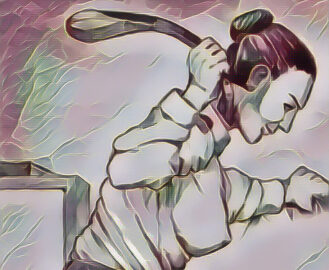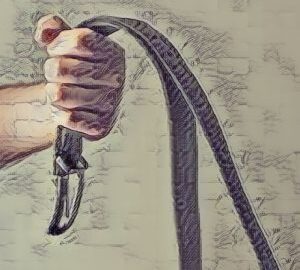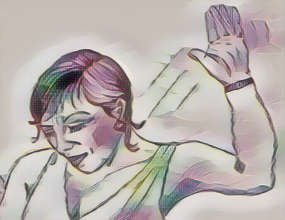(gap: 2s) There are certain moments in one’s childhood that remain forever vivid, as if etched in the mind with the sharpest of pencils. I recall, with the utmost clarity, the afternoon when my misadventure in the classroom led to a lesson I would never forget. The air was thick with the scent of chalk and polished wood, sunlight streaming through the tall windows and casting golden bars across the rows of desks. My heart thudded in my chest as Mrs. Rosen fixed me with a look that was both disappointed and unyielding. I knew, without a doubt, that if she were to inform my mother, there would be no escape from the consequences. My mother’s reputation for discipline was well known in our small town, and though she was not quick to anger, her punishments were always just—and, on occasion, severe. Yet, it was not the prospect of pain that troubled me most, but the thought of having brought shame upon my family.
(short pause) “Please, Mrs. Rosen, I beg you, do not write to my mother,” I implored, my voice trembling with genuine remorse. “I am sorry for the broken clock, and I shall pay for it, I promise.” My hands were clammy, and I could feel the eyes of my classmates upon me, their curiosity mingled with pity. Mrs. Rosen’s reply was measured and firm. “This is not merely about a broken clock, though you shall indeed pay for that. It is about your behaviour, which was thoughtless and immature. What possessed you to kick a football inside my classroom?” Her words echoed in the stillness, each one a stone in my stomach.
(pause) “I do not know, ma’am,” I stammered, my cheeks burning with shame. “I did not think it would go so far.” The truth was, I had not thought at all. The excitement of the game, the laughter of my friends, and the heady sense of invincibility that comes with youth had swept me away. “You did not think? That much is clear. Now, sit quietly while I write a note to your mother.” The scratch of her pen was loud in the silence. “Yes, ma’am,” I whispered, sinking into my seat, the weight of dread settling over me.
(short pause) “Ma’am?” I ventured, my voice barely above a whisper. “Yes, Bernard?” she replied, not looking up. “My mother does not read English.” She paused, a flicker of annoyance crossing her face. “Very well. You shall translate the note for her and ask her to reply in Spanish. I shall have another teacher read her response.” I nodded, my throat tight, knowing that this would only make matters worse. There would be no concealing the truth.
(pause) I carried the note home as though it were a burning coal, each step heavy with foreboding. The world seemed strangely muted—the distant bark of a dog, the rustle of leaves, the laughter of children playing somewhere far away. I was terrified of losing the note, but even more afraid of reading it aloud to my mother. When at last I stood before her, my hands trembling, I translated Mrs. Rosen’s words, each one a fresh wound. My mother’s face darkened, her lips pressed into a thin, hard line. The disappointment in her eyes was more painful than any punishment.
(short pause) First, she instructed me to empty my small bank, the coins clinking and rolling across the table, their meagre sum a stark reminder of my carelessness. It was not nearly enough to replace the teacher’s clock, now lying in pieces because of my reckless kick. My mother’s voice was cold and businesslike as she informed me that I would have to earn the remainder by performing small tasks for the neighbours. She would lend me the money to pay the teacher, but I would owe her every penny. The shame of it burned within me.
(pause) Then she sent me to the bedroom I shared with my two brothers. The room was dim, the late sun casting long shadows across the floor. I knew what was to come, and so did my brothers, who watched with wide, solemn eyes, understanding that they would be permitted to witness my punishment and learn from my folly. My mother entered, already holding the belt in her hand. It was a formidable object: thick, brown leather, worn smooth with age, the brass buckle heavy and cold. She doubled it over, the leather creaking ominously, and the sight alone made my knees weak. She placed our battered desk chair in the centre of the room and instructed me to stand behind it, placing my hands firmly on the seat. My heart hammered in my chest, my breath coming in shallow gasps.
(short pause) I did as I was told, bracing myself for what was to come. The first smack landed across the seat of my shorts with a sharp, stinging crack. The pain was immediate, a hot stripe that made me gasp and grip the chair more tightly. “Do you ever intend to grow up?” she demanded, her voice low and stern, yet not without a trace of care. The second smack followed, harder than the first, and I bit my lip, determined not to cry out. “What do you have in place of sense?” she continued, each word punctuated by another swat. The third and fourth smacks came in quick succession, the leather biting through the thin fabric, each one building upon the last until my eyes stung with tears.
(pause) She paused, allowing the pain to settle, and then began her lecture in earnest. “You must understand, Bernard, that life is not a game. You cannot do as you please and expect never to face the consequences.” Another smack, this one lower, caught the tops of my thighs and made me yelp. “You have embarrassed me, and you have embarrassed this family. Do you know how it feels to have your teacher write home about your foolishness?” The belt rose and fell again, the sting blooming across my skin, and I could hear my brothers shifting nervously behind me.
(short pause) She struck again, three or four times, each swat harder than the last, and then paused to lecture me about responsibility and respect. Her voice was low and controlled, but I could hear the hurt beneath the anger. A few more swats followed, the pain blooming anew, and another lecture—this time about the importance of honour and the shame I had brought upon our family name. The words echoed in my mind, each one a brand.
(pause) Then came the final round—a few more swats, the sting sharper now, and the last lecture, about wasting money we did not have and the foolishness of my actions. And then, the five hardest smacks of the evening, each one a punctuation mark on the lesson she was determined I would never forget. The belt snapped across my shorts, the pain flaring and then settling into a deep, throbbing ache. By the end, my legs trembled and my face was wet with silent tears, but I stood my ground, knowing this was the price of my mistake.
(short pause) Afterwards, my mother made me stand before my brothers and explain, in halting words, why I was being punished. The shame was almost unbearable, my voice barely more than a whisper. Then I was made to stand facing the wall for ten long minutes, forbidden to touch my aching bottom. The silence in the room was thick, broken only by the sound of my brothers’ quiet breathing and the distant tick of the hallway clock.
(pause) My mother detailed every part of my punishment in her letter to Mrs. Rosen, which I was required to deliver to the principal myself. I remember the way his eyes flicked over the words, his expression unreadable. He translated the letter for Mrs. Rosen, then looked at me and said, “If you were my son, I should have punished you in precisely the same manner.” The words stung, a fresh humiliation—I had never been chastised by a man, and the thought of it made my cheeks burn all over again.
(short pause) Since that day, I have never once been tempted to kick a football indoors. The memory of that afternoon—the sting of the belt, the weight of my mother’s disappointment, the shame of facing my brothers—has remained with me, a lesson written indelibly upon my heart. Yet outdoors, in the open air, with the sun on my face and the grass beneath my feet, I still play whenever I can, the joy of the game undimmed by the mistakes of my childhood. (long pause)



























































